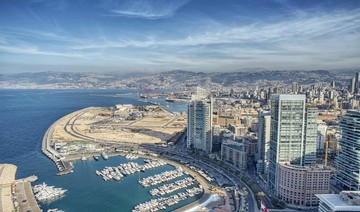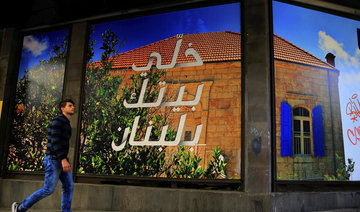BEIRUT: Lebanon requires “an immediate and substantial” fiscal adjustment to improve the sustainability of public debt that stood at more than 150 percent of gross domestic product (GDP) at the end of 2017, the IMF executive board said.
An IMF statement released overnight said IMF executive directors agreed with the thrust of a staff appraisal which in February urged Lebanon to immediately anchor its fiscal policy in a consolidation plan that stabilizes debt as a share of GDP and then puts it on a clear downward path.
Lebanon’s debt to GDP ratio is the third largest in the world.
“Directors stressed that an immediate and substantial fiscal adjustment is essential to improve debt sustainability, which will require strong and sustained political commitment,” the IMF executive board statement said.
It reiterated estimates of low economic growth of 1-1.5 percent in 2017 and 2018. “The traditional drivers of growth in Lebanon are subdued with real estate and construction weak and a strong rebound is unlikely soon,” it said.
“Going forward, under current policies growth is projected to gradually increase toward 3 percent over the medium term.”
Lebanon’s economy has been hit by the war in neighboring Syria. Annual growth rates have fallen to between 1 and 2 percent, from between 8 and 10 percent in the four years before the Syrian war. Two former pillars of the economy, Gulf Arab tourism and high-end real estate, have suffered.
Caretaker Prime Minister Saad Hariri has been designated to form a new government following parliamentary elections last month, Lebanon’s first since 2009, and has stressed the need for the state to see through long-delayed economic reforms.
Donor states and institutions are looking to Lebanon to implement the reforms in order to release billions of dollars worth of financing pledged at a conference in Paris in April. In Paris, Hariri promised to reduce the budget deficit as a percentage of GDP by five percent over five years.
The directors “noted that a well-defined fiscal strategy, including a combination of revenue and spending measures, amounting to about 5 percentage points of GDP, is ambitious but necessary” to stabilize public debt and put it on a declining path over the medium term.
They recommended increasing VAT rates, restraining public wages, and gradually eliminating electricity subsidies. Last year the government spent $1.3 billion subsidizing the state power provider — 13 percent of primary expenditures.
IMF urges Lebanon to make ‘immediate and substantial’ fiscal adjustment
IMF urges Lebanon to make ‘immediate and substantial’ fiscal adjustment

- Lebanon’s debt to GDP ratio is the third largest in the world
- Donor states and institutions are looking to Lebanon to implement the reforms in order to release billions of dollars worth of financing pledged at a conference in Paris in April












